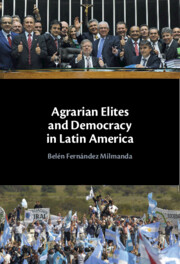Book contents
- Agrarian Elites and Democracy in Latin America
- Agrarian Elites and Democracy in Latin America
- Copyright page
- Dedication
- Contents
- Figures
- Tables
- Acknowledgments
- Abbreviations
- 1 Introduction
- 2 A Theory of Agrarian Elites’ Political Participation
- 3 Chile
- 4 Brazil
- 5 Argentina
- 6 Conclusions, Extensions, and Implications
- Book part
- References
- Index
5 - Argentina
The Limits of Nonelectoral Strategies
Published online by Cambridge University Press: 15 November 2024
- Agrarian Elites and Democracy in Latin America
- Agrarian Elites and Democracy in Latin America
- Copyright page
- Dedication
- Contents
- Figures
- Tables
- Acknowledgments
- Abbreviations
- 1 Introduction
- 2 A Theory of Agrarian Elites’ Political Participation
- 3 Chile
- 4 Brazil
- 5 Argentina
- 6 Conclusions, Extensions, and Implications
- Book part
- References
- Index
Summary
This chapter presents a case of nonelectoral strategies of political influence by agrarian elites in Argentina and the limitations of such strategies. Until 2008, Argentine landowners influenced politics through lobbying and, when this failed, through protests. The chapter presents evidence of how Argentine agrarian elites did not invest in electoral representation prior to 2008 because they did not experience an existential threat. It also shows how landowners decided to enter the electoral arena with the rise of an existential threat in the form of confiscatory taxes in 2008. Given Argentine agrarian elites fragmentation, they deployed a candidate-centered strategy, sponsoring the candidacies of a dozen agricultural producers for Congress under diverse party affiliations. However, institutional features and ideological differences among producers’ associations blunted the effectiveness of the strategy and led to its abandonment. Later on, with the consolidation of Propuesta Republicana (PRO) as a viable electoral alternative and the continuity of hostile polices, part of the Argentine agrarian elite has engaged in party-building. However, economic cleavages within Argentine agricultural producers continue to undermine the kind of sector-wide party-building effort that we saw in Chile during the democratic transition.
Keywords
- Type
- Chapter
- Information
- Agrarian Elites and Democracy in Latin America , pp. 155 - 195Publisher: Cambridge University PressPrint publication year: 2024

